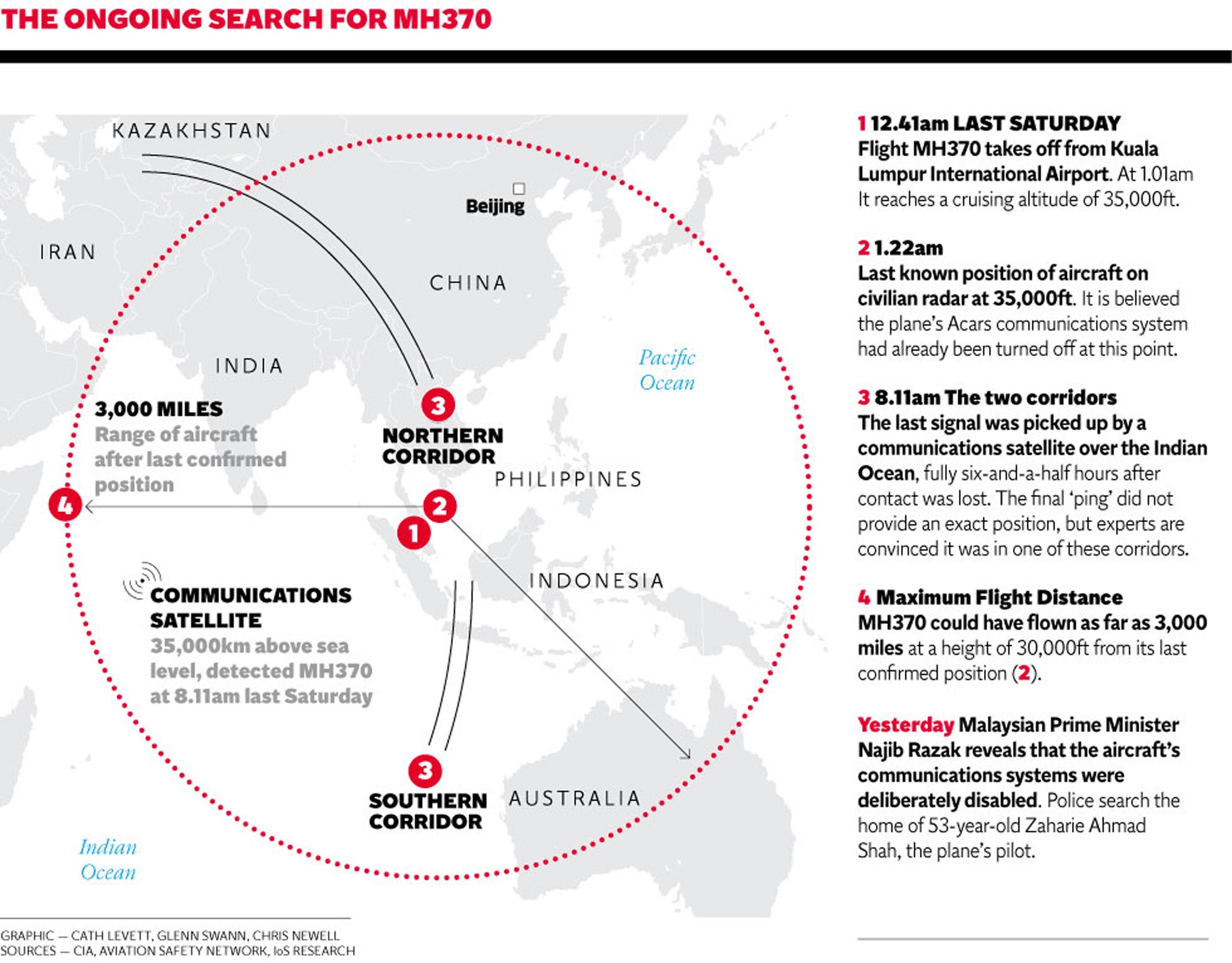Missing Malaysia Airlines Flight MH370: Any terrorist seizure of the plane ‘would have required one hell of a piece of planning’
What does the revelation that the aircraft flew on for seven hours after contact was lost tell us?

Flight MH370 weighs 250 tonnes, spans more than 60 metres and has been hunted by search teams from more than a dozen countries, but after more than a week the search for missing Malaysian Airlines jet is becoming vastly bigger. And vastly more complicated, amid suggestions of a “deliberate act” to take it off course.
The expansion came after leaked reports from US officials, suggestions of terrorism and the revelation from Malaysia's Prime Minister that investigators believed new satellite data showed “deliberate action by someone on the plane” had flown the aircraft and it's 239 passengers and crew of course for up to seven hours.
Speaking at a press conference in the Malaysian capital, Najib Razak said: “Clearly, the search for MH370 has entered a new phase. Over the last seven days, we have followed every lead and looked into every possibility… we hope this new information brings us one step closer to finding the plane.”
He added that, based on the data, investigators were now pursuing the belief that the plane's last location was along one of two possible corridors or arcs - a northern route stretching from the border of Kazakhstan and Turkmenistan to northern Thailand, or a southern one stretching from Indonesia to the vast emptiness of the Indian ocean.

Click here for enlarged view of graphic
And as police raided homes of the pilot and co-pilot, the Prime Minister said that, while investigators were still exploring “all possibilities”, attention was increasingly being focused on the possible role of the passengers or crew of the plane.
This weekend Malaysian officials, along with experts from the US National Transportation Safety Board, the Federal Aviation Administration, and Britain's Air Accidents Investigation Branch, continue to refine the new data, which originated from signals sent by the plane via the British company Inmarsat's satellite network over the Indian Ocean. The Independent on Sunday understands that these signals came from a “failsafe” function of an Inmarsat Swift 64 communications system fitted to the ill-fated aircraft.
The announcement by Mr Najib was the most definitive suggestion that investigators were exploring a possible hijacking or terrorism.
Aviation consultant Chris Yates said: “It's increasingly clear that the hand of some form of terrorism is at play here, whether from a group or one skilled individual. The levels of specialist aviation knowledge on display here cause me to cast my mind back to 9/11 when hijackers had acquired a level of technical and flight training.”
David Gleave, a former air crash investigator, added that any terrorist seizure of the plane “would have required one hell of a piece of planning”.

Phil Giles, a former air safety investigator who worked on the Lockerbie Bombing, said: “Taking over a Boeing 777 without experience or skill is akin to some Somalian bloke in a tiny boat trying to take over a super tanker and captain it. Unless the hijacker has a fair amount of technical and aviation knowledge he would have to rely on putting a gun to the pilot's head.”
In Malaysia this new information meant an end to the search in the South China Sea and a renewed focus on the Indian Ocean. At the same time officials were continuing to get radar data and other relevant information from the countries whose air space the two routes being examined pass through. The northern corridor would trace a busy route, passing northern Thailand and Burma and entering into China on the way towards central Asia.
The southern route, meanwhile, would pass over Indonesia and then the open waters of the southern Indian Ocean. The New York Times reported that officials believed the southern corridor to be the most likely to have been taken by the plane. “The US Navy would not be heading toward Kazakhstan,” a person briefed on the investigation told the paper.
Other have suggested the complexity of the search and sensitivity of military radar and satellite information may have been a cause of delay, pointing to the fact that American newspapers have been briefed by the Pentagon and that the destroyer USS Kidd and a P-8 Poseidon search plane moved into the Andaman Sea and Bay of Bengal prior the Malaysian government's announcement on Saturday.
Tony Cable, an investigator who worked for the UK Air Accidents Investigation Branch for 32 years, said: “The sensitivity of some of the military radar and satellite information here is clearly posing a problem for the investigation…. I suspect there is an awful lot more information that is known that is not being released.”
The last confirmed location of MH370 on civilian radar off Malaysia was at 1.31am last Saturday, about 40 minutes after it took off from Kuala Lumpur International Airport. At that point it was heading north-east across the mouth of the Gulf of Thailand on what should have been a six-hour flight to Beijing.
After that it seemed the plane disappeared from civilian radar but showed up - as a blip - on radar used by the Malaysian military. The latest revelation shows that the Boeing 777 continued to leave the faintest traces, in a series of “pings” from its Inmarsat Swift 64 system.
This 20-year-old communications is device fitted to 90 per cent of the world's wide body jet aircraft and in the case of MH370 enhanced the operation of the aircraft's flight transponder and Aircraft Communications Addressing and Reporting System (ACARS), both of which were deliberately deactivated early in the flight.
The IoS understands that the disabling of the ACARS system enabled a failsafe “ping” mode in the Swift 64 system, which has been compared to an “I'm here” announcement. The last of these messages came at 8.11am local time last Saturday, more than seven-and-a-half hours after it took off.
When fully operational Flight MH370's ACARS and Swift 64 only offer very basic altitude and location information and The IoS understands the aircraft wasn't fitted with more sophisticated equipment on sale, which would have allowed investigators to gain a full GPS fix.
Communication between the aircraft and satellites is only possible when the plane is airborne and the final transmission however would have come towards the very end of flight MH370's endurance - officials in Kuala Lumpur said the plane was carrying sufficient fuel for 8 hours.
However through analysis of the position and view of the receiving geostationary Inmarsat satellite over the Indian Ocean has allowed officials to plot a “rough calculation” of the two “arcs” the plane may have taken, which has led to increased search emphasis on the Indian Ocean and wild speculation the aircraft may have travelled as far as Kazakhstan.
The revelations were reportedly welcomed by relatives of the passengers in China, who believe the development keeps alive the hope they may somehow be reunited with their loved ones. However the government in Beijing - which has 153 citizens on board the flight - urged Malaysia to continue providing it with “thorough and exact information” on the search, state news agency Xinhua said.
Join our commenting forum
Join thought-provoking conversations, follow other Independent readers and see their replies
Comments
Bookmark popover
Removed from bookmarks